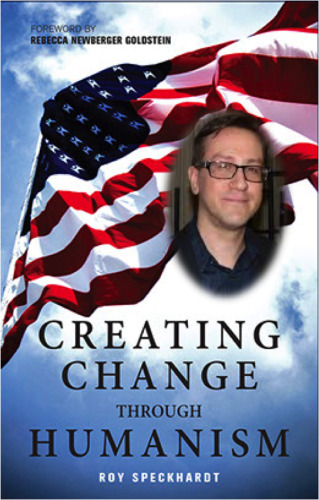Review: Creating Change Through Humanism Will
 No one has to knock on your door and tell you you’re humanist. People adopt a scientific world view and human-based rational ethics all by themselves. Unfortunately, that means they’re disconnected from humanist values, humanist mentors, and humanist community. That is to the detriment of those disconnected humanists because they don’t get that values-based community, and it is to the detriment of the humanist community because it makes us look small and weak.
No one has to knock on your door and tell you you’re humanist. People adopt a scientific world view and human-based rational ethics all by themselves. Unfortunately, that means they’re disconnected from humanist values, humanist mentors, and humanist community. That is to the detriment of those disconnected humanists because they don’t get that values-based community, and it is to the detriment of the humanist community because it makes us look small and weak.
All those humanists who don’t know they’re humanist now have a manual to help get them up to speed on their ideological heritage. If you or a friend “see no special reason to believe” (pg 30) in supernatural religion, then Creating Change Through Humanism may be exactly what you’re looking for.
Just another atheist book? Nope. And here’s why: It’s a positive primer for humanism that isn’t bogged down in ponderous philosophy or atheist invective. Creating Change acknowledges all those atheists books on already on bookstore shelves and sees “no need to be redundant” (pg 28). The book moves on to spend time on our shared history and community and values.
“Life’s fulfillment emerges from individual participation in the service of human ideals.” (pg 164)
While this is a great book for current humanists and a great book for interested non-humanists, the audience seems to be humanists who are not yet connected to the movement or who don’t even know they’re humanists. This is for your friend that says, “yeah, I don’t believe in god, but whatever.” Or your friend who says, “I’d speak out but I’m worried I’ll offend someone.” Also, your friend who says, “I don’t like to be labeled.” Or for you if you have those attitudes. All of these people who have humanist beliefs, humanist ethics, and a humanist life, but just haven’t plugged into the humanist community, can find in Creating Change Through Humanism an engraved invitation to be out, honest, and happy about your core values and beliefs.
“Humanist communities will be an accepted alternative to traditionally religious ones.” (pg 83)
Author Roy Speckhardt makes compelling arguments to encourage closeted humanists to come out. This was picked up clearly by Rebecca Newberger Goldstein, a formerly closeted humanists now out, who explained in the Forward to Creating Change: “Bifurcation between one’s inner and outer self exacts its toll.” Both she and Speckhardt discourage readers who might be silent about their beliefs as some presumed moral duty to protect the sensibilities of others. They point instead to the moral duty and social rewards of being honest about who you are.
“You already may have resolved never to speak about what you really think… (alternatively) there’s the indescribable happiness and relief of an out and open life.” (pg 97)
It is my opinion that Creating Change opens the door from where we are to the future of the humanist movement. We all know about the atheist ‘coming out’ party after Dawkins, Harris, Dennett, and Hitchens wrote their atheist manifestos calling out all the iniquities of religion. Atheists downright reveled in hearing thoughts we’ve all had about religion expressed with the razor wit and unassailable logic of the “Four Horsemen” and other great thinkers. But now we atheists we have gotten our concerns off our chest. More recently, humanists and atheists have been trying to reconcile with the rest of society without compromising on who we are. Creating Change brooks no supernaturalism while illustrating an inspiring history of humanism, and explanation of why our struggle is important, and a positive expression of our beliefs and values. Altogether this provides a wide open door for those who share our beliefs to join the humanist movement (with whatever label they like) or if they have different beliefs, to partner with humanism to improve the world (without having to be berated constantly about whether god exists).
“If we limit the movement to only those who are willing to identify solely as atheists, the nontheist movement would look small indeed.” (pg 28)
Creating Change has history, personal stories, values of humanism, political priorities, and lots of encouragement to be active in the community. The author expends no great effort to reinforce atheist argumentation or to wax philosophical about the nuances of humanist philosophy, but instead presents a concise and practical vision of humanism. The book does read at least to a certain extent as an advertisement for the American Humanist Association (AHA). Speckhardt is Executive Director of the American Humanist Association, but any bias can be forgiven considering the prominent role the AHA plays and has played and continues to play in the humanist movement. As a board member myself, I can say that Speckhardt barely scraped the surface of what AHA does. Pick up a copy for yourself and for all those friends of yours who don’t believe in god but who aren’t yet involved in the humanist movement.
